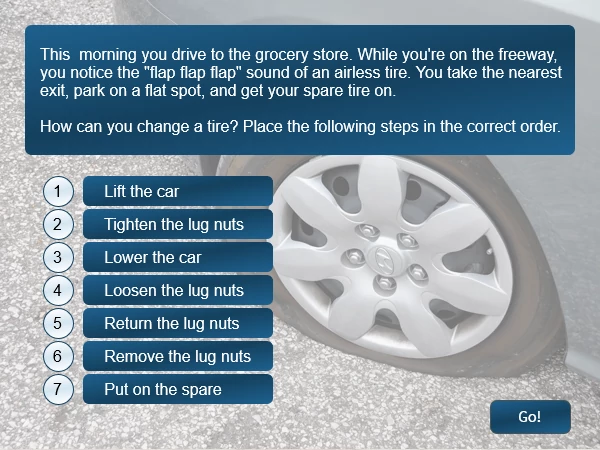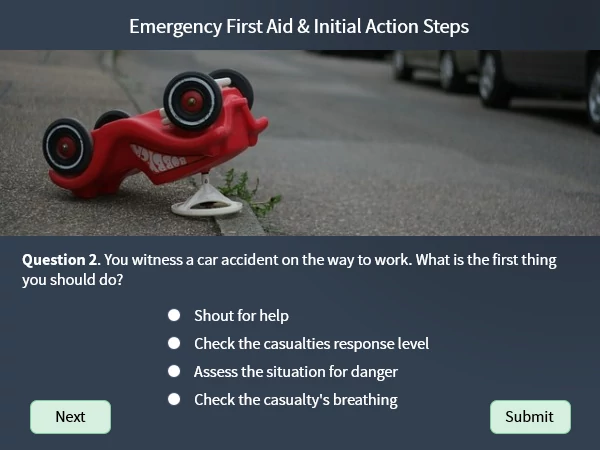As an essential part of eLearning courses, quizzes do good to both educators and learners. How so? Keep reading to learn four core benefits of eLearning quizzes as well as secret tips to design appealing and successful quizzes.
The very first tip! Own a powerful eLearning authoring tool like ActivePresenter! This tool offers 13 built-in interactive quiz types to help you make the most use of them. Click the following button to download ActivePresenter, then let’s get right into the 4 benefits of eLearning quizzes.

Benefit #1: Assess Knowledge
Of course, eLearning quizzes are meant to track, report, and evaluate learning progress and outcomes. A quiz placed at the end of a course acts as a graded assessment. Meanwhile, a mini-quiz at the end of every lesson aims to review key points prior to obtaining new information. In other words, mini-quizzes are used to ensure that learners successfully digested the information before moving onto the next section.

At the same time, quizzes can serve as a self-assessment tool which gives learners freedom to fail. Imagine you are in a classroom facing a tough but thought-provoking question. You burst to give it a try, yet face a fear of failure. But with quizzes, there’s room for everyone to exert themselves, test their ideas, and go wrong. This allows learners to figure out what they do know, what they don’t, what they need to focus on, and how to improve.
eLearning quizzes enable you to:
Test learners/yourself anytime, anywhere, at home, work, or even on the go on multiple devices – whether that’s a smartphone, tablet, laptop, or desktop device.
Provide instant grading and dynamic feedback to address common misconceptions and errors, reinforce key points, and close the knowledge gaps.
Randomize questions and answers quickly to prevent cheating. Definitely a nightmare if you want to manage all these stuff with hard-copy quizzes.
Benefit #2: Motivate Learners
eLearning quizzes can motivate learners to stay focused and keep moving forward. You can challenge learner perceptions to stir up their interest by asking a question that they’re likely to be wrong. Your learners will think, “Wait! That can’t be right!”. Then they’ll become curious about how and why they’re mistaken. That way, you grab their attention. For example, many go to the gym and target on “weight loss”, while in fact what they need to address is “fat loss”. Do you really know the difference between those two terms?
So, it’s wise to welcome learners to your health and fitness course with something like this:

Non-graded pre-test is an efficient lead-in to propel learners’ interest and prompt them. You can begin a course with a pre-test that covers major key points. By doing this pre-test, learners see what they already know and what they don’t, thus preparing themselves for what to focus on in the course. In addition, pre-tests can give learners control over their learning path. Depending on the test result, a learner can start with the level that most suits him instead of wasting time on what he already knows. Learning now becomes student-centered as students can make decision about what and how they will learn.
Take these handy tips for motivating learners with eLearning quizzes:
Fun factors make learners more enthusiastic. Thus, it’s good to add multimedia, scenarios, games, etc., to pique curiosity and improve learner motivation and commitment.
Quizzes prove beneficial for the sake of learning. High-stakes, scored quizzes are meant for assessment. Meanwhile, no- or low-stakes quizzes make learners stop and think, try, make mistakes, and learn from those mistakes without fear of grading.
Benefit #3: Engage Learners
Motivation is the “why” or reason we learn. Engagement, on the other hand, is typically the “what”. You want learners to become involved in learning. Then, think of quizzes – they really drive engagement by making learners interact with the content. Doing a quiz, a learner has to think, dig deep, and ultimately become an active participant.

To engage learners, obviously your quizzes should be fun to play and entertaining. You can include graphics or videos for visual appeal. This, however, is only the tip of the iceberg. A feeling of engagement emerges when your quizzes are relevant and relatable. The quiz should be relevant to the learner and relate to their own interests and life. So, you’d better make use of storytelling and scenarios to mimic real-world problems, thus letting learners see the applications and benefits of the content.
Engaging eLearning quizzes are at hand when you:
Mix up question types which have their own assessment purpose. Your quiz questions can come in all shapes and sizes: multiple choice, fill-in-the-blank, drag-n-drop matching, sequencing objects, scenario-based questions, and even games.
Give your quizzes some personality. Talk to your learners as if you were talking to them in person. It can be as easy as swapping the “Retry” button to “Take another chance!”, or replacing the “Submit” button with “Go!”. Use a friendly, playful tone of voice to make learners feel comfortable and eager.
Keep things to a minimum. Don’t overfill your quizzes with too many questions. Most of us have short attention span, we can’t stay focused for hours. A 2- to 3-minute quiz including 6 to 10 questions is good to go.
Benefit #4: Improve Knowledge Retention and Transfer
As a learning strategy, frequent no- or low-stakes quizzes help cement long-term learning. Why? Because these quizzes require you to bring previously acquired information to mind. By retrieving information, you organize it and create cues and connections. Repeated over time, information that is often retrieved becomes more retrievable in the future. That’s why quizzes give you plenty of room for knowledge retention. Practice makes perfect.

As The Learning Spy put it, learning can be defined as “the long-term retention of knowledge and skills and the ability to transfer between contexts”. At the end of the day, you only make learning count if you put it to good use. You need to get the most out of your courses, commit new knowledge to memory, and transfer knowledge from theory to real-world practice. That’s where quizzes come in. By practicing recalling knowledge, learners improve their ability to extend knowledge learned in one context to new ones, which is key to on-the-job performance.
Quizzes can be effective tools to support learning, not just measure it. Make sure you:
Make mini-quizzes a routine to measure retention in real time and identify gaps in knowledge. That way, learners can recognize if they have not retained what they’ve just learned.
Tie your quizzes into real world. Take a variety of real-world scenarios or examples in your quizzes to involve learners in solving real-life problems. As a result, they can gain experience that’s usable later on, thus boosting learning transfer.
Want to begin quizzing, but not sure how? We’ve got you covered!
Create great eLearning quizzes with ActivePresenter
Vary your quizzes with nine different types of questions.
Design professional random quizzes with slide pools and random slides.
Add interactivity with a flexible and powerful event-action mechanism.
Free up the course navigation and let learners discover content with conditional actions.
Embrace errors as learning opportunities with effective feedback.
Enjoy fully responsive design supported by HTML5 – run perfectly on any modern browser and device.
Kick start your courses with professional-looking themes.
Attract learners with a wide variety of stunning transition and animation effects.
And many, many more.